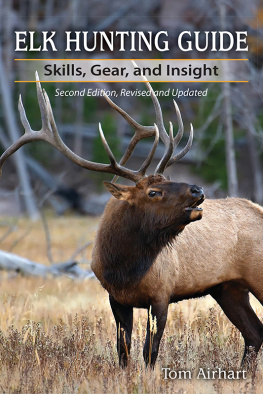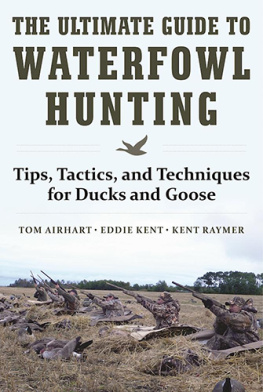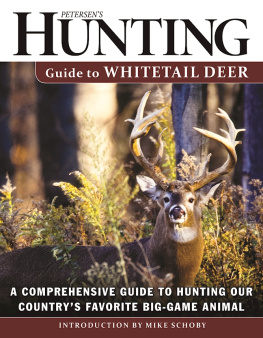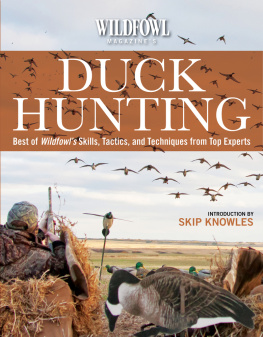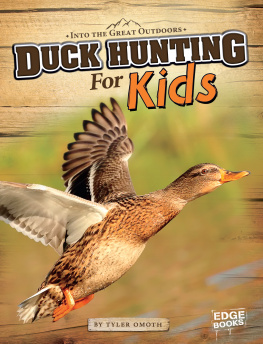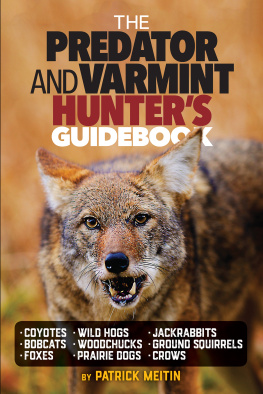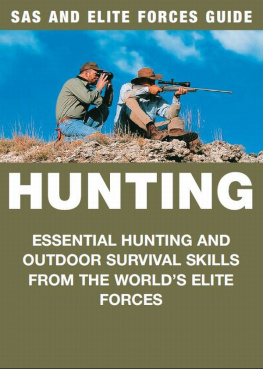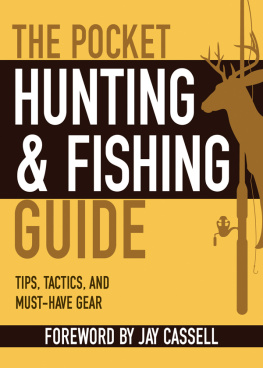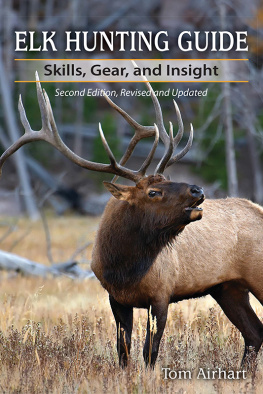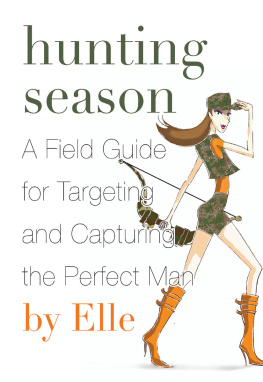
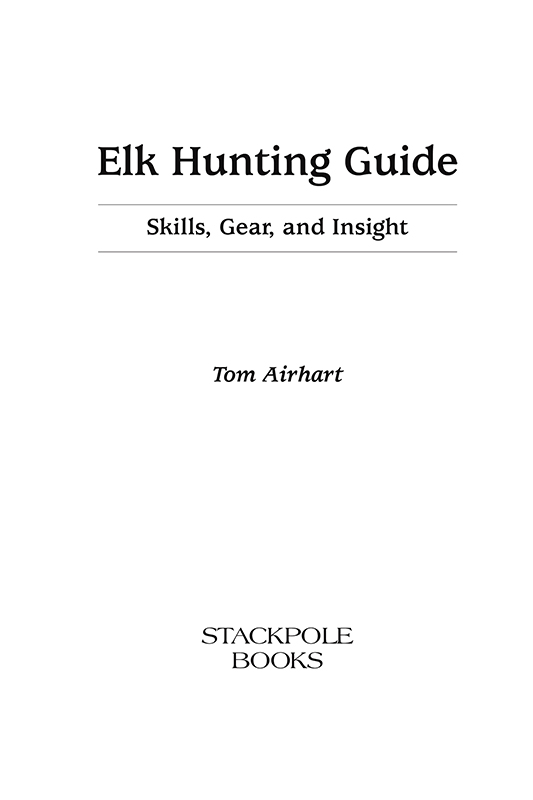
To all my family, including all the dogs, on either side of that misty pass over the great divide.
Copyright 2012 by Stackpole Books
Published by
STACKPOLE BOOKS
5067 Ritter Road
Mechanicsburg, PA 17055
www.stackpolebooks.com
All rights reserved, including the right to reproduce this book or portions thereof in any form or by any means, electronic or mechanical, including photocopying, recording, or by any information storage and retrieval system, without permission in writing from the publisher. All inquiries should be addressed to Stackpole Books, 5067 Ritter Road, Mechanicsburg, PA 17055.
Printed in U.S.A.
10 9 8 7 6 5 4 3 2 1
Second edition
Cover design by Tessa J. Sweigert
Cataloging-in-Publication Data is on file with the Library of Congress.
ISBN 978-0-8117-1092-3
eBook ISBN 978-0-8117-4973-2
PREFACE
T heres a widely quoted theory that the underlying motivation of most authors is a love of the subject. I subscribe to that theory. My other motivation is the absence, in the opinion of most serious elk hunters, of a single source of information that covers all aspects of elk hunting in enough depth to be practically useful in taking elk and finding good places and arrangements for hunting elk. What this book will do is give more depth than the many general interest publications available that touch on the general subject, even the same topics.
Elk hunting is different from other big game hunting. Part of the difference is the elk; part of the difference is the places that elk are hunted. Elk hunting is a lot more than actually bringing an elk back. If that were the case, I would have stopped going back to the mountains years ago. But this particular book does not try to do more than touch on all of those other aspects of elk hunting. This book is about bringing an elk back.
My basic premise is that the reader of this book is seriously interested in elk hunting. This serious interest can occur on two levels. A first-level reader wants to know specific and detailed information regarding what elk hunting is like and how to train and equip to get the most out of the experience. Ive been there: Its a serious matter for the prospective elk hunter considering shelling out as much as a few thousand dollars total for that first hunt. The second-level reader has been elk hunting several times, has maybe even taken an elk, and truly enjoys the elk hunting experiencewith one reservation. It seems that other hunters in camp always seem to have the luck, particularly the trophy-class-elk type of luck. Ive been there too. A lot of elk hunters stay there.
Years ago, I made a deliberate decision to learn how to get lucky on a consistent basis. I began to take a more analytical perspective on my experience and that of others in a search for the keys to successful elk hunting. I had made a daily record of my own experience, hunting out of professionally run outfitter pack camps of the Northern Rockies at the time, and Id listened to tales from friends and business acquaintances of hunting other regions with a wide range of hunting arrangements, from the economical to the very expensive. I set about expanding my own experience base, sticking to the more economical end of the hunting arrangements scale.
There are two ways to improve your chances of taking an elk, particularly a trophy elk; they are not mutually exclusive. Using the first approach (instructions included toward the back of the book), you can make arrangements to hunt where hunting pressure is controlledperhaps by limiting the number of licenses issued for the area (requiring hunters to have the patience to wait out enough seasons to draw a permit) or by landowner rights and the associated prerogative to apply other deterrents (extreme expense, mostly). The elk in such an area will be less hard-pressed and therefore easier to hunt, and more of them will have a better chance of surviving to full maturity and developing a trophy set of antlers. The second approach, involving less expense but requiring more dedication, is to become a better hunter and go after the elk in the hard parts of public hunting areas.
My outfitter pack camp experience has given me the opportunity to observe master guides in action. They usually accompanied the lucky inexperienced hunters. Gene, one such an outfitter/master guide friend, sold out of the outfitter business but decided to go together with some partners to make up a little pack outfit of their own and invited me to join. I bought a couple of well-behaved little mules that I knew from the old outfit and a big old pack horse that could carry most of a camp in one load as long as he didnt stumble and turn upside down. With a series of riding horses that were good for some world-class buckoffs still talked about around campfires in the Northwest, I was in, and we had ourselves an outfit, the Association.
I took a detached look at what I was doing, comparing my hunting style with the style of these experienced and consistently successful hunters, watching what actions came as second nature to them in particular situations, and learning what made the difference between an extended walk in the woods and a successful elk hunt. I started considering the hunting tales around the evening fire in a different light, looking past what had happened to why it happened. I suspect that it would never occur to most of the really good elk hunters I have known to consider elk hunting from this perspective. To them, its just what you do.
What is the key to elk hunting? Its the mindset of the hunter. No, make that mindsetsa different one appropriate to each phase of the hunt. Definable techniques and skills that can be perfected with practice are associated with each mindset. The hunter moves along with all senses pulling in information from the surroundings to locate the elk; moves toward where the elk should be; looks where the elk should be; and assumes the mindset of the stalk. The trophy is assessed if thats of interest; the shot is planned mentally using the essence of the image. The hunters focus expands momentarily to clear the shot, and then contracts to a 6-inch spot on the elk. The hunter has practiced precision shooting until it becomes second nature as an extension of this focus.
My fascination with elk hunting and these principles behind it compelled me to attempt to reduce them to writing. This book is what resulted. Its my cave drawing. Its intention is to help the reader make that hard-to-define next step in hunting.
I must make the reader aware that while in the process of practicing, defining, and writing these principles, I have discovered another essential truth: Sometimes, while in pursuit of difficult elk in difficult places, the elk hunter can indeed be lucky and just be in the right place at the right time and make a lucky shot. Any experienced elk hunter would agree that being lucky is not a bad strategy. But luck comes in two different flavors. The understated folks whose opinion matters to me would express it as the difference between making a lucky shot and being able to consistently be a Lucky Shot.
NOTE ON THE SECOND EDITION
To say that response to the first edition of Elk Hunting Guide has exceeded my expectations wouldnt be precisely correct. There were absolutely no expectations at all on my part as I set about writing it; I was putting the results of encounters with elk hunters of all typespotential and experienced, lucky and un-, old western types and city folksinto writing just for my own enjoyment. After the magazine article, then articles, that I never got around to sending finally got completely out of hand and organized into what looked, at least to me, like a book, I sent the entire mess off to Stackpole, the publisher of some of my favorite outdoor books. As my scribbles took form into the first edition, I now realize that I drifted toward addressing the folks that had been asking me questions for yearspotential or inexperienced nonresident elk hunters. (In the world of elk hunting, there are two types of hunters, residents of states that have elk you can hunt, and everybody else.) So the book came to be a comprehensive reference for the nonresident beginner, and, as it turned out, seems to have helped a lot of elk hunters with quite a few elk hunts under their belts to make sense of some of their experience. (As Ive noticed myself, experience is always inexperience while youre accumulating it, and at the time it often doesnt make any sense at all.)
Next page
